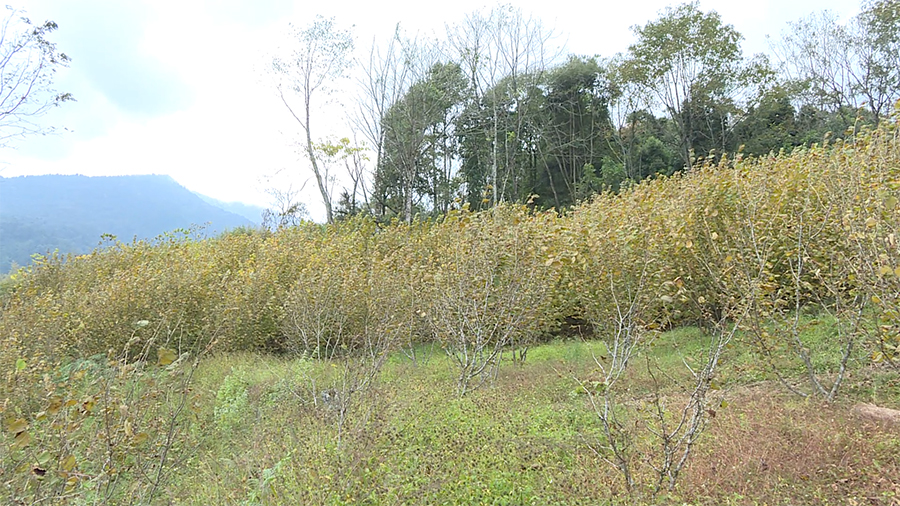
Hazelnut growers in Dagana are now asking compensation for the time and resources they have invested in cultivating hazel without any returns. Most trees in the district are a decade old now. However, the Mountain Hazelnuts Venture says compensating the farmers is not possible. The company is instead implementing measures to speed up the fruiting of the hazel trees.
Most of the growers in Dagana started planting hazelnuts in 2014. Like in other districts, growers were assured that the plants would start to bear nuts after three years of plantation. A decade on, there are no signs of hazelnuts. There are more than a hundred hazelnut growers in the district.
Last month, several frustrated growers asked for compensation from the company.
Raj Man Tamang, a hazelnut grower in Gozhi Gewog said, “now out of the four stems here, only one grafted stem has survived. And all these three years, again the company seems to be experimenting at the cost of the farmers. It has been a great loss for farmers like me. In my five-acre land, I have spent almost Nu 30,000 per year for the management of the farm.”
Jangchu Dema, a hazelnut grower in Gozhi Gewog said, “annually it requires at least ngultrum 30,000 to take care of the plants. Yet, there is no fruiting even after a decade. So be it the government or the company, we would be thankful if we are provided some support.”
“The company wanted to graft the plants again, but we said that we did not want to do it anymore. It is just an extra expenditure from our side. We want to uproot them. So, we are asking them if there is any possibility for us to get compensation for the loss we have incurred all these years,” said Chacka Man Tamang, a hazelnut grower in Gozhi Gewog.
Despite the frustration, there are still a few of them consistently taking care of the plants.
“We put a lot of dedication and interest in nurturing the plants. However, there is no reward in return. When I talked with growers from my area, everyone says the company has to explore possibilities to compensate the growers,” said Samdrup, Samae Tshogpa, Tseza Gewog.
“I thought maybe we should uproot the plants. But the officials of Mountain Hazelnuts told us to take care of the plants this year. They said they would make sure to visit the farms in January next year to graft the plants,” said Sona, a hazelnut grower in Tseza Gewog.
On the other hand, the Mountain Hazelnuts Venture said the project is a work in progress and that they have strategised methods to address the issue.
However, the company said compensating the farmers for delays in the plants bearing nuts is neither feasible nor suitable.
CEO of Mountain Hazelnuts Venture, Dr Sean Watson said, “we empathise and understand the challenges our growers are facing. But we do remain steadfast in our commitment to finding a lasting solution to building a sustainable Bhutanese hazelnut industry. Both parties took risks and made investments and the company has faced significant financial strain because our expenses to date have far outweighed our revenues. But despite these climate challenges, we remain dedicated to the long-term success of our partnership. To address these issues we are investing hundreds of millions of ngultrum into growers’ fields to rectify these varietal concerns and ensure a sustainable hazelnut yield in the future.”
The company said the main problem is that some types of hazel need a specific amount of chill hours during winter. However, at lower altitudes because of warmer winters which the company associates with global warming, this chilling effect is supposedly not working. The company said this affects older orchards, slowing down nut production and will never be commercially productive without grafting climate-compatible varieties which is called orchard conversion.
“For those orchards that have not come to fruition, we have initiated two methods. In places below 2400 metres, we initiated a grafting and pruning programme. For places above 2400 metres, the programme includes improving the orchard. We started the programme in 2022. These initiatives will help the tree bear nuts,” said Jamyang Tenzin, the Operation Head of Mountain Hazelnuts Venture.
The company said over the past two years, the company has been testing a climate grafting programme to address this. Based on the results of the pilot programme, the company said it is now expanding the programme to all the growers.
The company plans to expand the programme nationwide over the next five years. The programme targets a total of 4,000 acres of hazel for conversion by 2027. The company said 20 new staff are being trained who will be deployed across the country to implement the programme.
Hazel trees are grown across 18 districts in the country. Despite the fruiting issue, the company said it exported over 3,500 kilogrammes of hazelnuts to Australia last year and around 5,000 kilogrammes this year.
Devika Pradhan, Dagana
Edited by Kipchu








